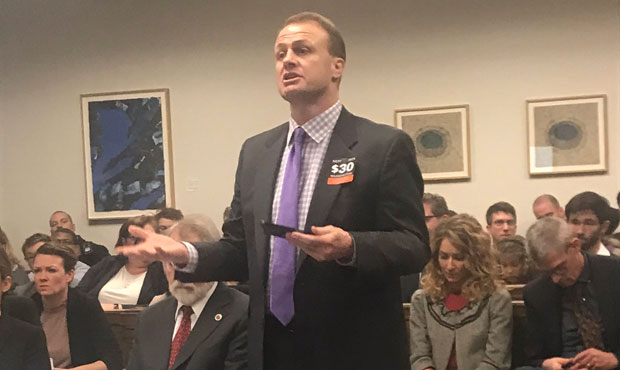Eyman calls judge’s 976 ruling ‘a win’ as court battle continues
Feb 12, 2020, 12:59 PM | Updated: Jul 8, 2022, 6:25 am

Tim Eyman attempting to argue his case in favor of I-976 in court in November. (Hanna Scott, KIRO Radio)
(Hanna Scott, KIRO Radio)
A King County Superior Court Judge issued an initial ruling on the ongoing I-976 court battle Wednesday, rejecting the core arguments that claim it’s unconstitutional.
How a legal challenge to I-976 might play out in court
Judge Marshall Ferguson struck down all but two issues with I-976 presented by the City of Seattle, King County, and other plaintiffs. An injunction currently in place against I-976 will continue to be in effect while additional discovery is completed on those remaining two claims.
Initiative sponsor Tim Eyman, who is running for governor, called the ruling “a win” for voters and “really, really stunning,” considering that a King County judge was ruling against a group of plaintiffs that included King County.
“It’s a real thrilling victory … it’s a very good outcome, and I’ve got a real spring in my step because of this ruling today,” he told the Dori Monson Show.
One of the main arguments presented by plaintiffs against the $30 car tabs measure was that it violates the “single subject” rule. Single subject rules exist to prevent a practice called “log-rolling,” when single initiatives contain multiple topics that are not necessarily related to each other.
That claim was roundly rejected by Judge Ferguson.
“Plaintiffs’ argument is not persuasive,” he stated in his ruling.
To that effect, he pointed out that I-976 exists as a broad directive related to lowering car tab fees.
“I-976’s ballot title is general, not restrictive,” he said in his ruling. “Because I-976 generally ‘concerns motor vehicle taxes and fees,’ its various substantive provisions need only be germane to that topic and to one another to survive single-subject scrutiny.”
Another argument from plaintiffs related to the single subject rule was based on how provisions laid out in I-976 also vary in the timing and scope of their implementation.
“In their view, some of I-976’s provisions are continuing and long-term in nature while others are specific, time-limited, and achievable in the near term,” Ferguson’s ruling describes. “Although Washington law certainly recognizes this distinction … Plaintiffs’ attempts to argue the distinction in this case hinges on ambiguous subjective characterizations of I-976’s provisions.”
The next steps for Sound Transit in the wake of I-976
In total, Ferguson dismissed seven separate claims of unconstitutionality made by plaintiffs. Discovery on the remaining two issues will need to be scheduled before the rest of the case can move forward.
Eyman said this victory makes him feel confident if the case goes before the Washington State Supreme Court.
“All of the various claims made by the government were shot down by this judge, and it’s going to be much harder for the nine Supreme Court justices to say, ‘No, we really do think voters were confused,'” Eyman said.
Washington State Attorney General Bob Ferguson, who was tasked with defending 976 in court, said in a statement, “We appreciate the court setting aside the antics of Tim Eyman, which made our job defending the will of the voters more difficult. It’s worth noting that the hearing in which Eyman had an outburst, we lost, and the hearing in which Eyman was silent, we won.”
In the meantime, Seattle City Attorney Pete Holmes noted that he is “disappointed” by the ruling, and that his office is “assessing the order and evaluating options for next steps.”
Seattle Mayor Jenny Durkan issued a statement on Wednesday:
We respectfully disagree with the ruling today from Judge Ferguson and will continue to make our case about the unconstitutionality of I-976. Our residents have made it clear they support increasing transit, safer roads for everyone, and free ORCA for our young people, and voted overwhelmingly for transit and against this initiative. We will assess what impact this ruling will have, but we remain optimistic about the ultimate outcome.












